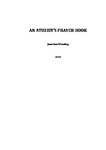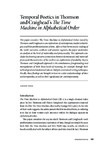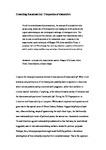Natural Strange Beatitudes: Geoffrey Hill's The Orchards of Syon, Poetic Oxymoron and Post-Secular Poetics AND An Atheist's Prayer-Book
| dc.contributor.supervisor | Caleshu, Anthony | |
| dc.contributor.author | Wooding, Jonathan | |
| dc.contributor.other | Faculty of Arts, Humanities and Business | en_US |
| dc.date.accessioned | 2015-02-10T10:53:53Z | |
| dc.date.available | 2015-02-10T10:53:53Z | |
| dc.date.issued | 2015 | |
| dc.identifier | 277440 | en_US |
| dc.identifier.uri | http://hdl.handle.net/10026.1/3223 | |
| dc.description | The poem 'After God' appears in the Manchester Cathedral publication, Poetry Competition 2013 Judged by Nicola Slee. The poem 'yud, hay, vav, hay' appears in Poetry Competition 2014 Judged by Helen Tookey. | en_US |
| dc.description.abstract |
Geoffrey Hill’s The Orchards of Syon (2002) occupies a contradictory position in twenty-first century poetry in being a major religious work in a post-religious age. Contemporary secular and atheistic insistence on the fundamentally crafted and flawed nature of religious faith has led Hill not to the abandoning of religious vision, but to a theologically disciplined approach to syntax, grammar and etymology. This dissertation examines Hill’s claim to a poetics of agnostic faith that mediate his alienation from a cynical and debased Anglophone contemporaneity. The oxymoronic nature of a faith co-existent with existential loss is the primary focus. The semantic distinction between paradox and poetic oxymoron is examined, and the agonistic and aporetic dimensions of the oxymoron are considered as affording theological significance. Poetic oxymoron as site of both foolish babbling and Pentecostal exuberance is made explicit, as is Hill’s relation to the oxymoronic nature of beatitudinous expression and the Kenotic Hymn. Hill’s reading of and relation to other theologically engaged poets is outlined. Thomas Hardy’s tragic-comic vision, Gerard Manley Hopkins’ restrained rapture in ‘The Windhover’, and T. S. Eliot’s expression of kenotic dissolution in ‘Marina’ are read as precursors to Hill’s revisionary God-language. William Empson’s significant difficulties with aspects of Hopkins’ and Eliot’s poetics is appraised as evidence of an oxymoronic and theological dimension within poetic ambiguity. Hill’s imperative to embody and enact theological vision and responsibility is tested in a reading of The Orchards of Syon. Paul Ricoeur’s perception of the religious significance of atheism is provocation for my own creative practice, as is the performative theology implicit in both Graham Shaw’s hermeneutic approach, and Hill’s visionary philology. Creative process draws on Simone Weil’s notion of decreation, the kenotic paradigm as exemplified in the life and writings of Dietrich Bonhoeffer, and the continuing secular vitality of the apostrophic lyric mode. | en_US |
| dc.language.iso | en | en_US |
| dc.publisher | Plymouth University | en_US |
| dc.subject | poetic oxymoron | en_US |
| dc.subject | metaphysical poetics | en_US |
| dc.subject | Geoffrey Hill | en_US |
| dc.subject | The Orchards of Syon (2002) | en_US |
| dc.subject | God's grammar | en_US |
| dc.subject | verse theology | en_US |
| dc.subject | living powers | en_US |
| dc.subject | visionary philology | en_US |
| dc.subject | post-Christian poetics | en_US |
| dc.subject | poetry & prayer | en_US |
| dc.subject | post-secular poetics | en_US |
| dc.subject | religiosity | en_US |
| dc.subject | atheism & poetry | en_US |
| dc.subject | agnostic faith | en_US |
| dc.subject | kenotic poetry | en_US |
| dc.subject | Beatitudes | en_US |
| dc.subject | Dietrich Bonhoeffer & poetry | en_US |
| dc.title | Natural Strange Beatitudes: Geoffrey Hill's The Orchards of Syon, Poetic Oxymoron and Post-Secular Poetics AND An Atheist's Prayer-Book | en_US |
| dc.type | Thesis | |
| plymouth.version | Full version | en_US |
| dc.identifier.doi | http://dx.doi.org/10.24382/4838 |
Files in this item
This item appears in the following Collection(s)
-
01 Research Theses Main Collection
Research Theses Main





